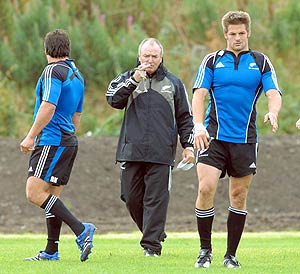Damian George
new author
Roar Rookie

New Zealand All Black coach Graham Henry, center, flanked by Byron Kelliher, left and Richie McCaw. AP Photo/NZPA, Ross Setford
Those infamous words may always come back to haunt Graham Henry. Throughout the duration of his first tenure in charge of the All Blacks – from 2004 until 2007 – Henry’s mantra was “judge me on the World Cup.”
Had he not uttered those words, we would surely have to rate Henry as one of the most, if not the most, successful All Blacks coaches of all time.
His record is simply phenomenal: 68 wins from 80 test matches gives the sterly Aucklander a winning percentage of 85 percent, behind only Alex Wyllie (86 percent) and Fred Allen (100 percent), who coached the national side just 29 times and 14 times respectively.
However, using Henry’s own criteria, we could not possibly put him in the top echelon.
Assuming success at the 2007 World Cup to Henry meant lifting the cup, Henry fell well short of this mark. Shorter, in fact, than any of his predecessors.
So, here we are. An All Blacks coach with four Tri-Nations titles in six years, a six-year hold on the Bledisloe Cup, two grand slams from two attempts, and not a single loss in the northern hemisphere, who is, by his own admission, a failure.
So let’s think rationally for a moment. What has Graham Henry done for New Zealand rugby?
First and foremost, he has repaired a damaged relationship between the All Blacks and the New Zealand rugby public. Following the John Mitchell era, which left many fans disillusioned and feeling alienated from their national rugby side, Henry began a conscious, albeit transparent, campaign to restore the All Blacks’ image in the public eye.
He made himself open to media, answered questions bluntly, carried himself well, and involved the players with the public – small measures, but significant in the circumstances.
The Probables v Possibles trial was re-introduced. It was a meaningless game, with no players from Super 14 finalists the Hurricanes and Crusaders taking part. But it is a tradition entrenched in the national game, and its one-off return was another sensible and well-received move from Henry.
His opening two test matches against England did nothing to harm his or the team’s image: the attractive brand of rugby played in two heavy defeats of England on home soil gaining most attention.
But it is worth remembering the attacking team Henry was in charge of upon his appointment was a team largely blooded by Mitchell.
Mils Muliaina, Joe Rokocoko, Ma’a Nonu, Daniel Carter, Rodney So’oialo, Ali Williams, Keven Mealamu, Andrew Hore and Tony Woodcock all made their debuts in 2002 or 2003.
Nevertheless, Henry introduced a number of players of his own and took the All Blacks to the 2005, 2006 and 2007 Tri-Nations, a 3-0 whitewash of the British and Irish Lions in 2005 and a Grand Slam in the same year.
And then came the World Cup.
After piling up massive scores against Italy, Portugal, Scotland and Romania, the All Blacks froze against their bogey team, France, a team they had decimated twice earlier in the year at home.
With a quarter-final exit, most accepted Henry would quietly resign from the top job, take it on the chin, realise he had not succeeded in his quest, and make way for his successor.
But Henry had unfinished business.
Not only did he re-apply for the job, the NZRU seemingly took pity on him and renewed his contract for another four years, his total of eight years in charge comfortably the longest of any All Black coach – despite being the least successful one.
People deserve second chances. But Henry had four years to take his side to World Cup success, Mitchell had two. Mitchell was sacked, Henry was given another four.
A coach should not be judged on one game. But clearly, Mitchell was.
Furthermore, although Mitchell frequently stated he was on a journey towards the World Cup, he never stated it was the be-all and end-all, unlike Henry who explicitly stated the holy grail was all that mattered.
That is water under the bridge now, though, and Henry has made a good fist of his second term as head coach, the rise of South Africa the only real threat to his side in the past two years.
Once again, the All Blacks will go in as favourites for the World Cup next year, only slightly ahead of the Springboks this time, though, due to home advantage.
If the All Blacks once again fail to lift the game’s greatest prize, Henry will not only be remembered as the coach who lead the All Blacks to their worst ever world cup result, but also as the only coach to be in charge of two unsuccessful world cup campaigns.
Like it or not, nothing in between will matter. There has been very little mention of next year’s tournament from ‘Ted’ in the last couple of years. Maybe he has learned his lesson.